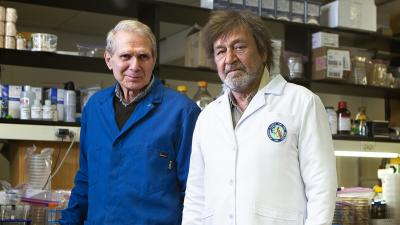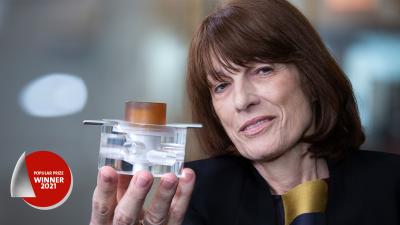Robert N. Grass and Wendelin Stark
DNA-based data storage
Winners of the European Inventor Award 2021
With the increasing digitalisation of every aspect of society, the rate at which we generate data is accelerating fast. However, the hard drives and servers on which we store most of this data have finite lifespans that rarely exceed a decade. Considering society's reliance on the data it produces, developing a robust and long-term method of data storage is a priority. Since nucleic acids store genetic information, scientists have been interested for decades in their potential to capture other kinds of data. However, the feasibility of the idea depends on the ability to protect synthetic DNA from chemical degradation after exposure to elements such as water, heat or air.
Inspired by the way that the DNA of fossilised creatures is preserved for hundreds of thousands of years, Grass and Stark devised a way to reduce the fragility of existing DNA storage methods. Their patented technology converts digital data (a series of zeros and ones) into a corresponding sequence of the four DNA base pairs using a synthesis technique that includes error-correction coding to make up for any DNA damage or loss. This DNA is then encapsulated in glass particles with diameters up to 10 000 times thinner than a sheet of paper. The particles can withstand temperature damage and most corrosive agents, and are easily recovered by treating the particles with a fluoride solution that dissolves glass without impacting the DNA itself. Considering the miniscule size of the glass particles, the technique could be used to securely protect vast quantities of data for millennia.
On the path to everyday application
Grass and Stark's patented technology is commercialised through Haelixa AG, an ETH Zurich spin-off that they co-founded with two of their colleagues. Apart from storing data, their invention can also be used to label products such as precious stones, organic cotton and even tropical food, thereby ensuring that specific indicators - for example, product origin or working conditions - are traceable throughout the supply chain.
Grass and Stark continue their work at ETH Zurich, with Grass as Titular Professor at the Functional Material Laboratory, and Stark as Full Professor at the Institute of Chemical and Bioengineering and Head of Functional Materials Engineering. Alongside Haelixa AG, which now has 11 employees including advisors, Grass and Stark have co-founded several other companies to commercialise their work. According to the inventors, the pair envisage a society in which DNA data storage is effective, commercially viable and accessible in everyday technology.
Media gallery
Patent numbers:
Contact
European Inventor Award and Young Inventors Prize queries:
european-inventor@epo.org Subscribe to the European Inventor Award newsletterMedia-related queries:
Contact our Press team#InventorAward #YoungInventors









